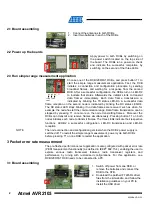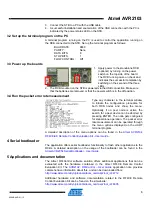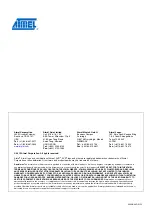
Atmel AVR2103
3
8368B-AVR-01/12
3. Connect the STB to a PC with the USB cable.
4. A successful installation and enumeration of the USB connection with the PC is
indicated by the power status LED on the STB.
3.2 Set up the terminal program on the PC
A terminal program running on the PC is used to control the application running on
the RCB connected to the STB. Set up the terminal program as follows:
BAUD RATE:
9600
PARITY:
None
DATA BITS:
8
STOP BITS:
1
FLOW CONTROL:
Off
3.3 Power up the boards
1. Apply power to the standalone RCB
(optional) by turning on the power
switch on the top side of the board.
The RCB runs a power-on check and
indicates the successful completion by
switching on the second of the three
LEDs.
2. The RCB mounted on the STB is powered via the USB connection. Make sure
that the batteries are removed or that the power switch is in the off position.
3.4 Run the packet error rate measurement
Type any character in the terminal window
to initiate the configuration procedure for
both RCB nodes and show the menu.
Optionally, if no peer node is active, the
search for a peer device can be aborted by
pressing ENTER. The node gets configured
for stand-alone operation. The packet error
rate measurement can be operated through
the menu options displayed on the UART
terminal program.
A detailed description of the menu options can be found in t.
4 Serial bootloader
The application offers serial bootloader functionality to flash other applications to the
RCBs. A detailed description on the usage of the bootloader can be found in the
5 Applications and documentation
The Atmel RF4Control software solution offers additional applications that can be
evaluated with the hardware contained in the Atmel RF4CE Remote Control
application note provides
comprehensive information about this, and can be downloaded from:
Additional hardware and software documentation related to the RF4CE Remote
Control Evaluation Kit can be found on the kit website:




